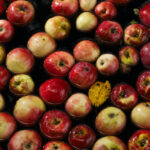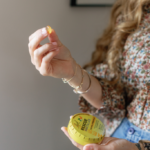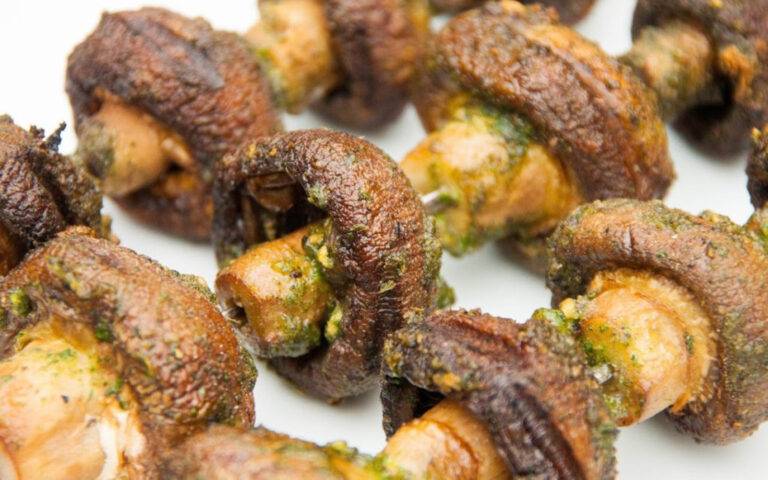From 2014 to 2021, Minnesota farmer James Wolf raised organic soybeans, corn and wheat, selling the grains to farmers across the midwest, both for seed and animal feed. Selling organic grain allowed Wolf to make more money than selling conventional grain—a lot more money. He purchased two Chevy convertibles and a vacation home in sunny Arizona with a portion of the $46 million he earned.
Last year, Wolf was indicted by the US Attorney’s office for organic fraud. The state claims that the “organic” seed Wolf was selling was not, in fact, organic. In May, Wolf pleaded guilty to the charges.
While the magnitude of Wolf’s scam is unusual, the fact that he falsely profited from the “organic” label is not. Thousands of people do it, which is why many countries have strict regulations about what organic is and is not. Over the COVID-19 pandemic, fraud escalated in many sectors, and more fraudulent food items entered the market as criminals capitalized on fears of food shortages and as fewer inspectors were available. Federally accredited agencies are trying to suss out the fakes—while some organic farmers wonder whether staying organic is worth the price of admission.
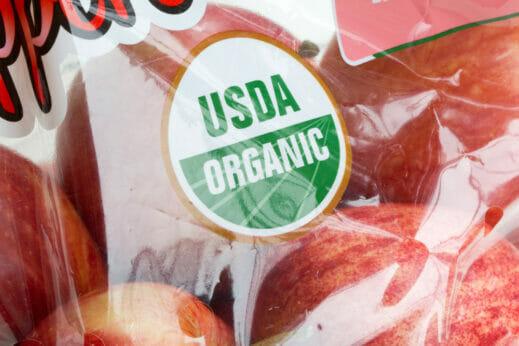
Photo: Shutterstock
What is organic, anyway?
Organic farming is a practice that emphasizes natural processes, ecological balance and the conserving of resources. The USDA’s National Organic Program (NOP) was first enacted in 1990, with the laws being amended occasionally since then. Synthetic fertilizers and genetic engineering are prohibited, among other measures. The label can cover crops, livestock and dairy products, and the industry is huge—worth about $62 billion last year.
But the process to become certified as an organic farming operation is a lengthy one. It takes three years to allow for any previous synthetic substances applied to the fields or used on the farm to filter out. And in that time, farmers are on the hook for the higher costs associated with organic farming, without any guaranteed return.
Then, once farms have been certified, there’s a yearly testing process, which dives deep into the farm’s yield and audits its books. “We spend a few hours with the inspector, and that’s a walk around every garden plot we have, and talking about what we’ve grown there and our practices, the rotation, any pest issues, anything like that,” explains Shepsi Eaton, owner and farmer at Darthia Farm in Gouldsboro, ME. The inspector also asks a variety of questions geared towards figuring out what the farm produced and how that matches its receipts. “How much seed did you purchase? How much did you plant? How much area did you plant? What were the yields in a given week? How much did you harvest? How much did you sell?”
It’s a big job for both the farmers and inspectors. Eaton says they have to ensure that all of their paperwork and records are updated within the NOP’s system and maintained in a way that enables easy sharing with the auditors.
It’s also not cheap. Costs for organic certification vary based on gross income of the operation, along with the size, type and complexity of the farm. For Eaton’s two acres of vegetable crops, he pays about $1,400 per year.
There are also some hidden costs. In 2019, when Daniel Lagueux decided to apply for organic certification for Hip Peas, his Hooksett, NH farm, he says he didn’t realize all of the time investment required. “Once I started talking to my farm manager, I asked, ‘how many hours a week do you think [are needed to log everything?]’” Lagueux recalls. “He said it was about 40 extra hours of labor.”
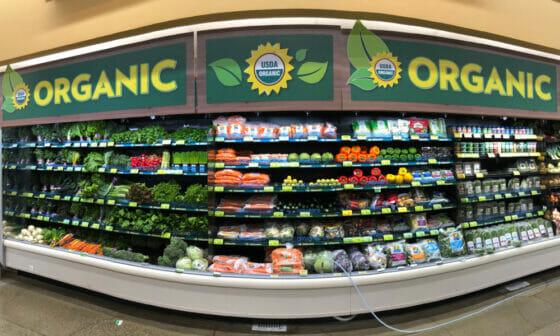
Photo: Shutterstock
Who makes sure “organic” is really organic?
There are two main methods of certifying the food you eat is organic. The first is with a reciprocity agreement. The United States has an organic equivalent agreement with several countries, including Canada, Japan and the European Union. If a food product is labeled as organic in one of these countries, then it will also meet the standards within the US, and the food can be imported and exported between the countries.
The second, and more common method, is through inspections. The NOP oversees the certifications of all the organic farms and producers in the country, and it works with accredited agencies around the world that follow USDA guidelines. “We go to the certification agencies and we literally watch them do the inspections. We review all of their systems to make sure that they are effectively certifying and overseeing those farms,” says Jennifer Tucker, deputy administrator of the National Organic Program. “It’s actually a very robust and very rich network of oversight professionals…It’s one of the most regulated food systems in the United States.”
But the system has changed in recent years, geared more towards large commercial operations. Small producers, like Eaton, say many parts of the process don’t scale down to small producers, especially within questions about their supply chain. “We just grow vegetables and sell them in our farm store…What are we going to find here?”
Lagueux agrees, saying that the certification and testing process might make sense for commercial farmers selling in large venues, such as grocery stores and supermarkets. But on a smaller scale, the strictures can be harder to work with. “With my honey, I couldn’t put ‘organic’ on it, because I couldn’t prove that my bees were going to certified organic flowers on my property,” says Lagueux.
What makes it more frustrating for producers like Lagueux and Eaton is that the organic certification system, for all its bureaucracy and rules, can be worked around—and people do that often. “There’s definitely an incentive for people to go out and just say ‘oh yeah, we’re certified organic,’” says Lagueux, noting that producers can charge a premium on organic products. “Nobody takes a carrot or a potato and tests it to see if there’s any chemicals on it. It’s only by numbers and your word. You can have two businesses side by side and have sales from one company mix into the other and falsify the system. It’s pretty simple.” People have faked organic crops, including corn and soybeans, making millions of dollars.
For USDA inspectors, the severity of the fraud boils down to one thing: willfulness. According to Tucker, accidental fraud—or fraud that is not “willful”—happens all the time. Maybe there’s a vendor at a local farmers market selling “organic” blueberries, unaware that she’s not certified. She’s committing fraud, but unintentionally. “When we detect that there’s been a problem, operations are given a chance to explain what happened and what they’re going to do to correct the system,” says Tucker. From there, punishments range from small fines to legal action, depending on the scale and scope of the fraud.
It’s the intentional, or willful violations, where we often see the most egregious fraud. Take mass balance fraud: A producer gets an organic certificate for 100 acres of grain and begins selling grain for those 100 acres. But inspectors look at the books and realize the yield sold is much closer to 200 acres. While the producer is certified organic, they are only certified for a portion of the goods they’re selling. That’s why Eaton has to walk his garden plots every year, justifying each batch of carrot seeds.
Additionally, there are many large agricultural countries that do not have reciprocity agreements with the US, including China and Brazil. It’s not to say that any one particular country or region is responsible for flouting regulations or inherently setting out to commit fraud—but simply that there are more opportunities. “It’s a little bit harder to have strong oversight” in other countries, says Carolyn Dimitri, an associate professor at NYU and a member of the federal advisory committee to the NOP. “If I were going to increase the number of certifying bodies, I would think that the global markets would be a place you would want to look…It’s partly that the countries are big, the farms are small and the practices and norms are different. ”
But, ultimately, says Dimitri, the difficulty is that there’s no great way to test many of these crops at the point of sale. What does an organic tomato look like or a conventionally grown soybean? Without clear ways to distinguish between the crops, both inspectors and consumers are always one step behind.
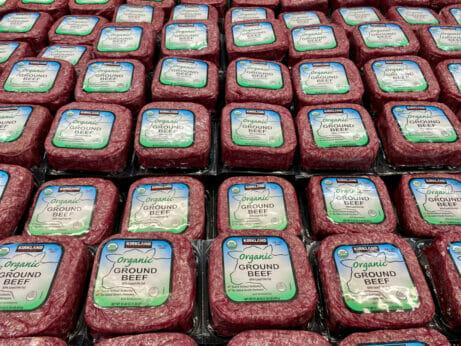
Photo: Shutterstock
Are there enough inspectors?
There are more than 17,000 organic farms within the US and thousands more worldwide, so thousands of people are needed for yearly inspections and enforcement.
From the NOP’s perspective, its public-private partnership is a good thing. By partnering with accredited agencies, the agencies can be flexible and bring on more staff as needed, shrinking or swelling the number of inspectors according to trends in the market.
But critics of that public-private system say that inspectors are incentivized to look the other way as middle-men in this system. They aren’t government employees, and if their jobs are at the whims of the market, why not ensure there is an ongoing need for their services by making sure as many organic productions as possible pass through the system? Tucker refutes this, saying that the NOP audits the certifiers and pays attention to the enforcement actions they dole out to their farms. “Most years, an organic farmer or business will get kicked out [of the system] at a rate of about one per day, because they’ve not been able to come into compliance. I think that shows the system works, because those certifiers are taking enforcement actions against their own clients to protect all the farms [that] are playing by the rules.”
Not everyone agrees that the current system is working well, however. Dimitri, for instance, thinks the inspector positions should be higher-paid, professional designations, although she acknowledges this isn’t the most popular opinion. “You actually make so much more money as an inspector if you work in a gluten-free factory, for example. So, in that sense, it’s hard to keep people in the inspection business, because you have to be very committed to the process.” If the NOP increased the cost of the organic certification for farmers, Dimitri says inspectors could be paid more, the agencies could retain more staff and it could increase the rates of inspection for each farm—ideally cutting down on fraud.
“The fact that the system is built on being able to shrink and expand the labor force as you need it, it just puts it in the same old problem that agriculture already has. Everything is on this thin margin, and people aren’t always very well paid unless you’re in one of the food companies. I would like organic to be better than the rest of agriculture.”
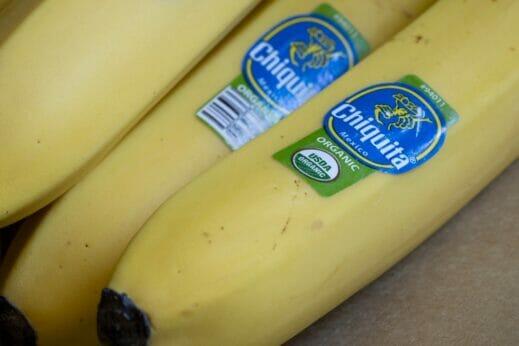
Photo: Shutterstock
Do people trust the organic label?
For farmers such as Lagueux, fraud in the system has eaten away at the integrity of the organic designation. Rather than representing a higher ideal, organic certification is now, for Lagueux, merely another logo to put on packaging. “I think it’s losing credibility in the industry, because there are ways of screwing with the system…There’s always going to be greedy people in the world,” he says. “You don’t start by stealing $100, you start with $2. And you get away with it. And then the next week it’s $20. And then you justify what you’ve done, and you go ‘fuck the certification, it doesn’t even matter.’” It was that realization, along with the higher costs, that led to Lagueux giving up his official organic status after just two years.
In Maine, Eaton is considering doing the same thing. Darthia Farm has been certified since the late 1970s, when Eaton says the organic label carried a certain cache. But now, he’s not sure it’s worth it to maintain it anymore. For one thing, his customers don’t really care one way or another if the food is certified, as they sell hyper locally to people who get to know the farm and how it operates.
Plus, Eaton is concerned about how much harder it could become to maintain his certification. He currently uses horse power in his fields, but the horses aren’t fed a certified organic diet. What happens if their manure comes under scrutiny? “You can’t take your tractor into a conventional field, and then drive it into [your organic] garden…It’s only a matter of time before they see the horses the same way.”
In January of this year, the NOP introduced the Strengthening Organic Enforcement amendment, intended to shore up some of those loopholes and ensure stronger checks throughout the supply chain. The Organic Trade Association (OTA) calls the new rules “the biggest change to organic regulations since the creation of the National Organic Program” in 1990.
The updates have been long awaited, with many hoping they can curb fraud in the system. But there will still be pressures put on smaller producers. The Maine Organic Farmers and Gardeners Association says it’s mostly pleased with the final version, but it worries that additional strictures could impact smaller certifying bodies, which may not have the staffing to fully implement the changes. “The NOP assumes that certifiers will increase fees to cover the additional expenses, which shifts the burden to small producers—who are largely not the cause of the fraud taking place,” writes Chris Grigsby, director of MOFGA’s certification, in a press release. He says that, because the NOP is a federal program, the additional costs should be borne by appropriations from Congress, rather than the producers themselves.
Consumers of organic food aren’t just buying the food itself. They’re buying a promise that they can trust the label and certifications. “The consumer can’t be out there on the farm, they can’t be reviewing all these papers. So, they trust us to do that,” says Tucker. Full implementation of the Strengthening Organic Enforcement amendment will come in March of 2024. Once it’s in full swing, producers and officials hope that the new regulations can indeed lower fraud in the organic food system—both for consumer trust and for their own bottom line.
The post Can You Trust the Organic Food Label? appeared first on Modern Farmer.
This content was originally published here.


